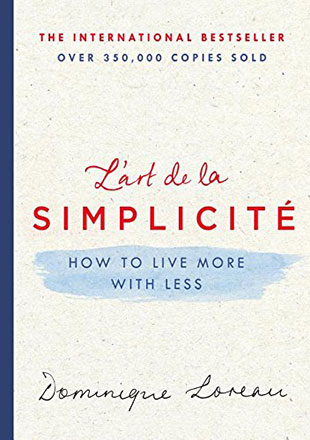"We are only just beginning to realize the dangers of excess and opulence. More and more people are seeking the joys and benefits of a simpler, more natural existence, looking beyond the endless temptations of consumerism to devise new, meaningful, contemporary lifestyles."
— Dominique Loreau
Dominique Loreau is a French essayist who has lived in Japan since the 1970s. After fully adopting the Japanese way of life, she now offers a seminar for those who want to simplify their lives.
Her philosophy is propelled by the ancient truth of less is more. Her bellwether book L'art de la Simplicité is an international bestseller with over 350,000 copies sold. Now it is available in English for the first time.
Simplicity
What does she mean by simplicity?
"Simplicity means possessing little, clearing the way for the bare necessities, the quintessence of things."
"Simplicity is beautiful because it brings hidden joys."
"Simplicity is the perfect union of the beautiful, useful, and appropriate. Nothing should be superfluous."
"Simplicity means creating harmony among very few objects, each one of which is unique and indispensable."
In a world that is getting more loud, brutish, and violent, it is easy to see why so many pine for simplicity in their busy and complicated lives. During the last decades, we have seen some of the egregious dangers of too muchness and consumerism run wild. In the first two chapters, Loreau makes a good case for the rise of minimalism and the fall of a life of material excess.
Beauty
"A home furnished with nothing but a handful of beautiful, absolutely essential things is a haven of peace. Cherish it, clean it and inhabit it with care and respect — it is a protective shell for your greatest treasure: your own self."
"Style and beauty help us to progress, and surpass ourselves. In Japan, beautiful deportment and gestures express the perfect balance between intent and effort. The right way to handle chopsticks, or the perfect posture when sitting on a tatami mat, all are connected to an attitude of asceticism practiced with grace and rigor."
"Creating a beautiful life is the highest vocation. Remember: beauty is present in small details, in order and cleanliness, in things that support and nourish us."
It is only natural that Loreau write about the spiritual practice of beauty since the Japanese elevation of this virtue is revealed in the tea ceremony, flower arrangements, calligraphy, decorative boxes, and other activities. The Balinese have also integrated beauty into everyday life. In her exploration of this topic, the author covers ethics, aesthetics, the body, and nurturing self.
Rituals
In another section, Loreau suggests that we sanctify the simplest actions using rituals. To begin, she quotes Antoine de Saint-Exupery's classic children book:
" 'What's a ritual?' said the Little Prince.
'Something else that is too readily forgotten,' said the Fox.
'It is what makes one day different from another, or one hour from the other hours.' "
The author then asked about our personal rituals and what they bring to our lives. "Montaigne said that a life lived to the full is a life enriched and nourished by ritual. Rituals bring comfort when we stumble under the pressures and demands of everyday existence."
With grace and enthusiasm, Loreau mines the many aspects of simplicity in chapters on inner ecology, other people, and polishing yourself like a pebble. All of these play a major role in the continuing quest for a life full of pleasure and meaning.
